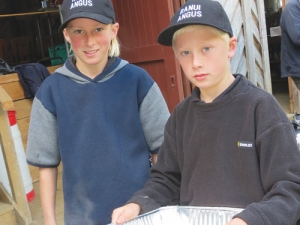That was the theme of a recent workshop staged by Beef + Lamb NZ Genetics at Lin Johnstone's farm near Whanganui.
The workshop was one of a series by BLNZ Genetics around the country. Reporter Peter Burke went along to find out.
The venue for the workshop was perfect: a special saleroom that looks fit for staging an opera, built by Lin Johnstone senior for the bull and heifer sales he and son Lindsay run.
Facilitating the day are Annie O'Connell and Max Tweedie, extension officers from BLNZ Genetics. They use the whiteboard and run an interactive session to engage the participants and set them tasks to learn about the tools available to them on the Genetics NZ website.
The objective of the workshops, says Tweedie, is to enable farmers to make better decisions when buying a bull, using the information on genetics supplied by BLNZ, and to make them aware of the physical characteristics of a bull that will suit their particular needs.
"In the early stage of the seminars we set an objective and develop what they need on-farm and then relate that back to breeding values and show them how they can select and meet their objectives. The computer work required is easy to use and with a few simple tips farmers can make a more informed decision," he explains.
"It all depends on the breeding objective they have selected. On the maternal side, that's getting a calf on the ground and making sure that cow gets back in calf. In the terminal environment, it's hitting market specs and having standard NZ carcase requirements. In those premium markets, it's also specific meat quality requirements."
Tweedie says farmers must understand the needs of consumers; if they do and produce the product they want, they will get a premium. He says being "end product focused" is important.
"Bull buyers targeting the market will make better bull selection and increase the profitability in their systems. At the same time, if we can get a change in breeder philosophy, that will also provide gains for everybody," he adds.
Tweedie says the uptake of the workshops has been strong in regions such as the North Island East Coast and Southland, but he says it is always a challenge to get people along in some areas. He hopes farmers who attend the seminars will talk to others and the farming networks will result in more farmers finding out about and using the information readily available to them.
Tweedie adds that BLNZ is looking at developing web-based tools to help farmers make the best decisions possible on bull buying.











